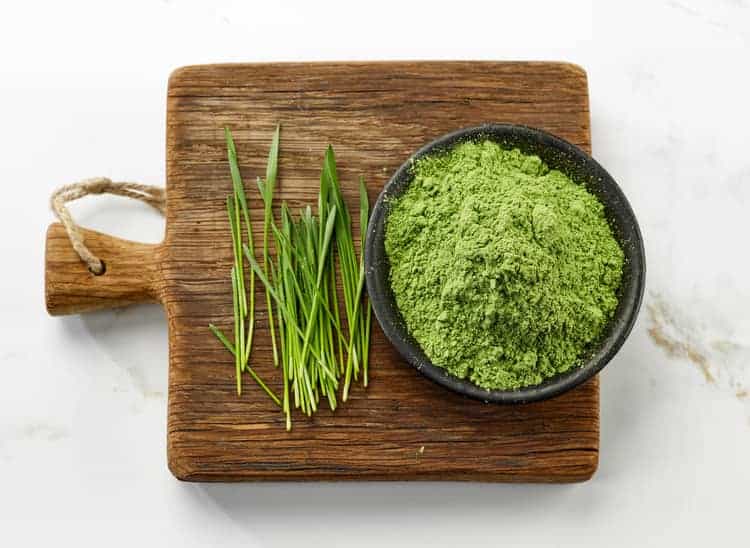
Of all the supplement types that are out there, perhaps none offers as many different benefits as green powders. Because they’re food-based, green powders nourish the body with real nutrients – as opposed to lab-made synthetics – that may alleviate a host of conditions, including bloating.
However, the fact that they’re food-based also means that some green powder ingredients may actually trigger bloating!
So, to help you make a choice that works in your favor, this guide on the best green powders for bloating is going to cover:
- how green powders could – and in some cases, contribute to – bloating.
- things to look for when choosing a debloating greens supplement.
- 10 green powders that you can use to reduce bloating and support your digestive system.
Note: a green powder is not the same as the food it comes from. Meaning, kale powder is not as nutritionally complete as fresh kale. So, use green powders as a supplement to a healthy diet and lifestyle, not as a substitute for those things. In addition, this post contains affiliate links and I earn a commission (at no additional cost to you) if you use them to make a purchase.
COMPARING THE BEST GREENS POWDER FOR BLOATING
| Product | Price* | Cruciferous Veggies | Sweetener |
|---|---|---|---|
| Live It Up Supergeens | $39.99 | Yes | Monk fruit |
| Grateful Gut | $29.99 | No | No sugar/sweetener |
| Ancient Nutrition Organic SuperGreens | $36.30 | Yes | Monk fruit |
| Organifi Green Juice | $56.99 | No | Monk fruit |
| Green Blends Detox & Digest | $25.65 | Yes | Stevia |
| Perfect Food Green Superfood | $32.14 | Yes | No |
| Pure Synergy Superfood Powder | $57 | Yes | No |
| Jade Leaf Matcha Powder | $52.20 | No | No |
| Dr Berg’s Organic Wheat Grass Juice Powder | $42.74 | No | Stevia |
| Green Vibrance | $32 | Yes | No |
TOP 10 GREENS POWDERS FOR BLOATING, DIGESTION AND GUT HEALTH
These are my picks for the best greens supplements that reduce bloating:
- Live It Up (formerly Enso) Supergeens – TOP CHOICE
- Grateful Gut – TOP CHOICE
- Ancient Nutrition Organic SuperGreens
- Organifi Green Juice
- Green Blends Detox & Digest
- Perfect Food Green Superfood
- Pure Synergy Superfood Powder
- Jade Leaf Matcha Powder
- Organic Wheat Grass Juice Powder
- Green Vibrance
3. Live It Up (formerly Enso) Supergreens – TOP CHOICE
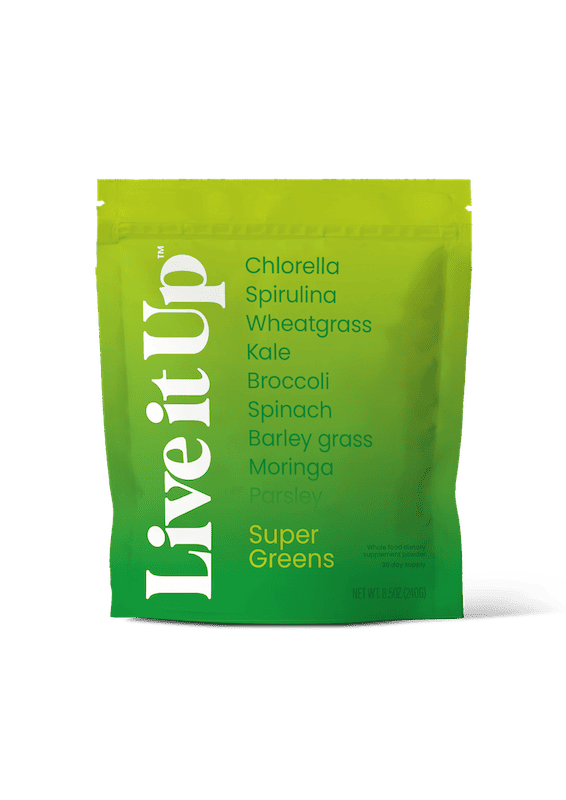
Pros
I have personally tried several of the products on this list and overall, this my top pick for bloating (and a few others things, as you’ll see shortly).
Ironically, when the company (at the time called Enso) initially suggested that I partner with them (and get a free product), I dragged my feet because I was experiencing greens powder fatigue!
Eventually, I took the time to closely inspect their ingredients. That’s when I kicked myself for not trying out the product sooner!
One of the things that stands out about this powder is the fact that it contains four herbs that have traditionally been used to relieve bloating and support the digestive system, notably:
- Peppermint
- Dandelion
- Parsley
- Ginger
In addition there’s oat grass and barley grass in the form of juice powders, which allows you to get the health benefits of these plants in a form that is more absorbable.
And just to ensure that you get all the basics that you need for digestive support, this formula also comes with a digestive enzyme complex and probiotics.
But it doesn’t stop there 🙂
The nutrition facts also give you a breakdown of the nutrients you’re getting from each serving. So, you get to see just how much vitamin C, B vitamins, magnesium, zinc, iron and other nutrients you get.
A breakdown of nutrient isn’t something that all green powders offer, so I definitely appreciate this!
Lastly, while there are cruciferous vegetables – which can trigger bloating for some people – there are only two (kale powder and broccoli powder).
Given that other brands go overboard with cruciferous veggies, it’s nice to see this company take a less-is-more-approach.
After 1.5 weeks of using this I noticed that the pre-period bloating I had recently been experiencing went away. My energy levels were also more stable.
And a final note: the flavor is deliciously minty fresh, thanks to actual mint leave and monk fruit. I have never had a greens powder that tasted so good without some artificial flavors lurking in the ingredients! It also combines well in plain water, with no clumping!
Cons
- There are some whole grasses in the form of wheatgrass and barley grass.
2. Grateful Gut
Pros
If you’re a less-is-more person, then this no-frills powder – with six ingredients – is for you.
But don’t be fooled by the simplicity of the formula. The six ingredients provide a broad spectrum of nutrients (most notably, prebiotics and digestive enzymes):
- Celery: rich in potassium which regulates water retention; helps repair damaged gut lining.
- Jerusalem artichoke: rich in inulin, which is a prebiotic that supports digestive health.
- Lemon balm: herb that is traditionally used to soothe upset stomach, gas and bloating.
- Ginger: traditionally used to stimulate digestion and support overall digestive function; can be helpful in repairing damaged gut lining.
Lastly, there are no gums, preservatives or processed sweeteners.
Overall, a simple and straight-to-the-point greens powder.
Cons
- No probiotics.
- There is no added sugar and many reviews make it clear that the flavor isn’t the greatest.
3. Ancient Nutrition Organic SuperGreens

Pros
Unlike many of its counterparts, Ancient Nutrition actually does a good job of not trying to every possible fruit and vegetable into its powder.
So, that means you actually get more of what is present in the blend, like:
- belly-soothing and anti-inflammatory powerhouses like tumeric, peppermint, ginger, matcha and blueberries.
- adaptogens like ashwagandha, reishi mushrooms and cordyceps mushrooms (those mushrooms are also rich in prebiotics).
- probiotics and digestive enzymes.
Cons
- There are two cruciferous vegetables (kale and broccoli stalk), so be aware if this class of veggies bothers your digestive system.
4. Organifi Green Juice
Pros
Green Juice powder contains the adaptogen, ashwagandha, which helps the body better adapt to stress.
This may help alleviate bloating because stress reduces blood flow to the digestive system. If that stress is chronic, that can contribute to a host of digestive symptoms, including bloating.
In addition, Green Juice powder comes with matcha (which is anti-inflammatory) and wheat grass juice powder.
Furthermore, there’s lemon, turmeric and beet root, all of which are soothing to the digestive system.
And last but not least, this is one of the few green powders I’ve used that truly dissolves in water easily and tastes good with plain water (though Live It Up still surpasses it in the flavor department).
 Cons
Cons *role=”document”, aria-multiline=”true”*
*role=”document”, aria-multiline=”true”* *aria-label=”Block: Heading”*
*aria-label=”Block: Heading”*
- There is some wheat grass powder (not juiced) which some people may be sensitive to.
*role=”textbox”, aria-multiline=”true”*
*aria-label=”List text”*
- If you’ve very sensitive to the taste of chlorella and spirulina, you might pick up on it. Personally, I don’t taste them. I find that the company does a great job at masking the unpleasant flavors!
5. Green Blends Detox & Digest
Pros
One of the things that stands out about this powder is the presence of probiotics and powerful debloating ingredients like papaya, pineapple, peppermint, cardamom, ginger, fennel, turmeric, parsley and beet root.
As for the greens, this blend uses spinach, alfalfa, spirulina and chlorella.
There are also two grasses (wheat and barley) and a cruciferous vegetable (broccoli). As long as your body isn’t super sensitive to either of these, these will help to support detoxification and keep you regular.
Cons
- Contains natural flavors (which is often synthetic) and citric acid (if derived from corn, it contains some glutamic acid aka MSG. Some people can be sensitive to MSG).
6. Perfect Food Green Superfood
Pros
This powder contains 5 grasses – kamut, oat, wheat, barley and alfalfa – which are all juiced (making it easier to digest).
There are also plenty of debloating ingredients like:
- parsley.
- celery.
- apple.
- ginger.
- plenty of sprouted seeds.
- probiotic and digestive enzyme blend.
Cons
Contains some cruciferous veggies (cauliflower, cabbage and broccoli). However, since there are so many other ingredients to support the digestive, their presence may not be much of an issue.
7. Pure Synergy Superfood Powder

Pros
Pure Synergy is a company that I absolutely love because their products are always free of fillers, additives, preservatives, sweeteners, or natural flavors. And this powder continues that trend.
While this powder contains what you’d expect – digestive enzymes, grass juices, leafy greens and green algae – it also has something that Pure Synergy is known for: healing herbs and plants.
So you will find ingredients like adaptogens (astragalus, eleuthero, schizandra), herbs for calming the nervous system (like skullcap) and medicinal mushrooms (like reishi and maitake, which are very good sources of prebiotics).
Cons
- There is no added sugar or even, stevia. Some reviews on their website make it clear that while they love the potency of the product, the flavor may not be to everyone’s liking.
8. Jade Leaf Matcha Powder
Pros
Green tea is well known for containing antioxidants that help with inflammation.
But what happens when you take green tea leaves and grind them into a powder? You get matcha powder, which delivers about 3 times more antioxidants compared to standard green tea (source).
And that’s great news for your gut because the physical pain, distended tummy and gas that usually accompany bloating are very often linked to inflammation.
As for this particular matcha powder, it is ceremonial grade matcha. Ceremonial grade is considered the best from a nutritional perspective because it is made from younger green tea leaves (while cheaper grades of matcha are made from older leaves that don’t pack the same nutritional punch).
Cons
- This is 100% matcha powder which means there are no extras (like digestive enzymes, probiotics or other greens).
9. Dr Berg’s Organic Wheatgrass Juice Powder

Pros
With just one key ingredient, this powder proves that you don’t need a gazillion ingredients to make a great product.
Made from organically grown wheatgrass, this powder goes through very gentle processing: first, it is cold pressed into a juice and then CO2-dried to produce the powder.
All of this helps to preserve the nutrients, resulting in a concentrated, raw powder that is both soothing and nourishing to the digestive system.
This comes in two flavors and personally, I love the lemon flavor! It also dissolves really easily in water, so you don’t have to worry about always having to put it in a smoothie.
Cons
- No other ingredients to support digestive health.
- The stevia flavor is prominent in the lemon flavor (in fact, more so than the lemon, in my opinion). If you don’t like the taste of stevia, then you’ll want to avoid this.
10. Green Vibrance

Pros
Green Vibrance doesn’t skimp on its ingredients, with a single jar giving you:
- a variety of grass juices (and whole leaf grasses).
- probiotics at 25 billion CFU (which far exceeds what most brands use).
- digestive enzymes
- an antioxidant blend with everything from berries and green tea, to grapeseed and vitamin C powerhouses (like amla, camu camu and acerola).
- herbs for liver, skeletal and stress support.
Cons
- Contains some cruciferous vegetables.
- Although the amount of probiotics is high, some experts say that more doesn’t necessarily mean better results for your gut health.
- Contains added fiber which contribute to constipation for some people.
- Unlike everything else on this list, Green Vibrance isn’t organic. Although this list wasn’t intended to be an all-organic list it just worked out that way 🙂
WHAT GREENS HELP WITH BLOATING?
Green veggies (such as leafy greens), green herbs (such as mint) and microgreens are just a few of the green foods that can soothe bloating.
The main thing that these foods have in common is their chlorophyll content (which gives them a green color and multiple health benefits).
In particular, chlorophyll is anti-inflammatory and may also support detoxification. As a result, consuming certain greens can help to soothe the constipation, gas and other discomfort associated with bloating.
In addition, these green veggies contain a variety of antioxidants, vitamins and minerals that support the digestive system and the entire gut.
Now, having said all this, keep in mind that for some people, excessive amounts of cruciferous greens and foods that are high in FODMAPs (fermentable oligosaccharides, disaccharides, monosaccharides and polyols) may aggravate bloating.
This is particularly relevant for anyone with IBS (irritable bowel syndrome).
| Celery | Lettuce |
| Spinach | Watercress |
| Cucumber | Broccoli sprouts |
| Peppermint | Arugula |
| Matcha green tea | Dandelion greens |
| Alfalfa | Stinging nettle leaves |
| Spirulina | Parsley |
| Chlorella | Cilantro |
| Wheatgrass | Green peppers |
| Beet greens | Kale (low FODMAP) |
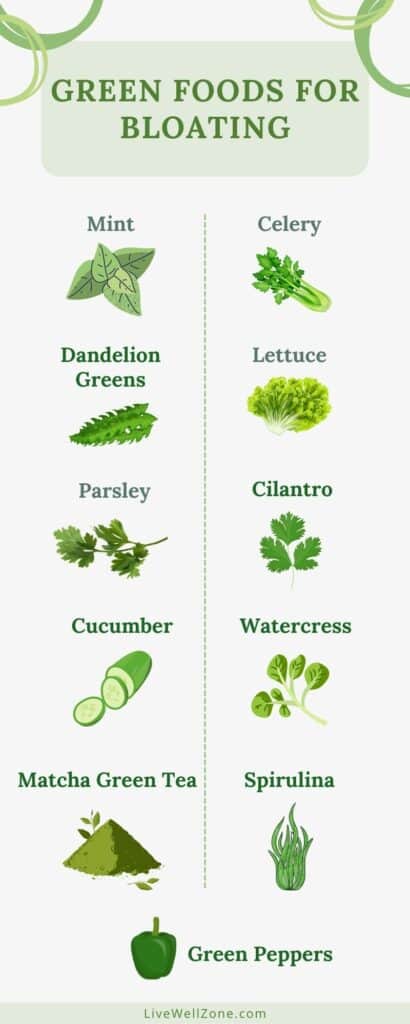
HOW TO CHOOSE A GREENS SUPPLEMENT FOR LESS BLOATING
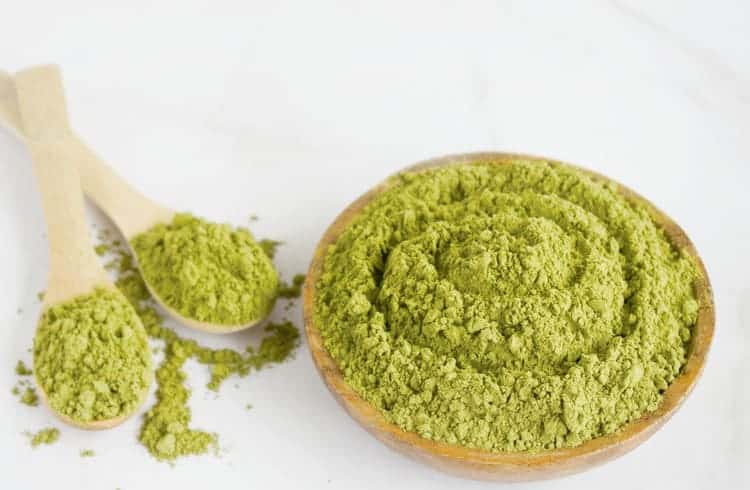
There are many different factors that contribute to bloating.
And that means that what helps one person won’t necessarily help another.
So, as you go through this list, don’t think of the items listed as “must-haves.”
Rather, this list is a general guideline of things that tend to ease bloating.
A green powder that has one or more of these might be a helpful ally.
1. Look for digestive enzymes
- The body naturally makes digestive enzymes, which are proteins that are essential for breaking down food.
- If your body doesn’t have sufficient amounts of these enzymes, you could experience bloating, gas, diarrhea, belly pain and other symptoms.
- Getting these enzymes from a supplement might help alleviate bloating and other digestive issues.
2. Consider probiotics
- Probiotics do not break down or digest food but they are important for supporting the proper function of digestive enzymes.
- Not having a healthy gut flora can contribute to bloating and other digestive issues.
- While food is the best way to improve the diversity of your gut microbiome, supplements that contain probiotics may also help.
3. Avoid powders with too many cruciferous vegetables.
- These vegetables contain a type of sugar called raffinose which the body cannot digest.
- When the raffinose gets to the large intestine, your gut bacteria starts to ferment it, which can contribute to bloating for some people (source).
- So, while you don’t necessarily have to avoid all cruciferous veggies, too many of them in a powder might be problematic.
4. Watch out for sugar alcohols.
- Xylitol, sorbitol, erythritol and other sugar alcohols cannot be digested by the human body.
- Sugar alcohols end up in the large intestine where they are metabolized by our gut bacteria.
- If you don’t have the proper bacteria in your large intestine, then bloating, gas and other digestive issues can occur (source).
5. Avoid high amounts of whole grasses
- Unlike cows, the human body is not set up for digesting grasses (such as wheatgrass or barley grass). in their whole form.
- In addition, if you have leaky gut or other imbalances in your gut, grasses might contribute to digestive issues.
- So look for powders that have small amounts of grasses or powders that use grass juice powder. This is simply the grass that has been juiced and dehydrated to a powder. The juicing process removes the indigestible fiber, so it’s easier on your digestive system.
6. Be careful with added fiber
- Although fiber is essential for reducing constipation, too much of it can contribute to bloating.
- Watch for ingredients like psyllium husk, which could be too much for some people.
7. Avoid gums, preservatives and artificial dyes
- Plant-derived gums (guar gum, locust bean gum, gum arabic) are additives that show up in some greens supplements. They are indigestible and while most people tolerate them well, they can be problematic if you already have a sensitive digestive system.
- As for preservatives and artificial dyes, they can affect the gut, making it easier for bloating to occur.
BENEFITS OF A GREENS POWDER FOR BLOATING AND DIGESTION
1. Supports Gut and Digestive Health
Most greens powders contain probiotics, prebiotics and digestive enzymes, which all support gut health in various ways:
- Digestive Enzymes: Digestive enzymes are necessary for breaking down complex molecules – such as proteins, fats and carbohydrates – into smaller, more easily digestible components. By supporting proper digestion, these enzymes can help to ease bloating.
- Probiotics: These bacteria colonize the gut and add to the overall diversity of your gut flora. They are essential for supporting the work of digestive enzymes. Having a healthy microbiome also helps prevent the overgrowth of harmful bacteria and yeast that can lead to gas and bloating.
- Prebiotics: These are a special group of fibers that act as the “food” for the growth of probiotics. In addition, prebiotics are known to regulate bowel movements, produce neurotransmitters that affect mood, stimulate the production of hormones that affect appetite and much more (source).
2. Nutrient Dense
Green powders can be very helpful for bloating – and overall digestive health – because they provide the body with foods, herbs and nutrients that balance water retention, while also keeping you regular.
Some popular ingredients in greens supplements that are known for having debloating properties include:
- celery.
- beets.
- peppermint.
- fennel.
- papaya (it has an enzyme called papain that supports the digestive system).
- turmeric.
- leafy greens.
3. May Ease Constipation
Some greens powders have added fiber, which adds bulk to your stool and encourages regular bowel movements.
This can help alleviate bloating and also support overall digestive health.
RELATED QUESTIONS ABOUT GREENS POWDER FOR DEBLOATING
Can greens powder help with IBS?
Many greens powders contain FODMAPs, which can really aggravate IBS symptoms. So, it’s best to check with your healthcare provider before adding any greens powder to your routine.
Why is greens powder making me bloated?
It is possible to experience some bloating when you first start using green powders, especially when they include ingredients like cruciferous vegetables, fiber or sugar alcohols (such as xylitol). However, the bloating tends to subside after your body becomes accustomed to the powder.
That said, there are instances in which the bloating doesn’t disappear. In such cases, you might have to:
- focus first on healing your digestive system through whole food and juices. Then try the green powder again at a later time to see how your body responds.
- try a different green powder with a different set of ingredients (to see if your body responds positively).
CONCLUSION
Although having a good understanding of ingredients will help you choose a good green powder, it’s even more important to listen to your body and give it time to adapt to a new supplement.
Also, remember that lifestyle factors and the rest of your diet can contribute to bloating.
So, pay attention to those other aspects of your life to ensure that you’re doing everything you can to keep bloating at bay.
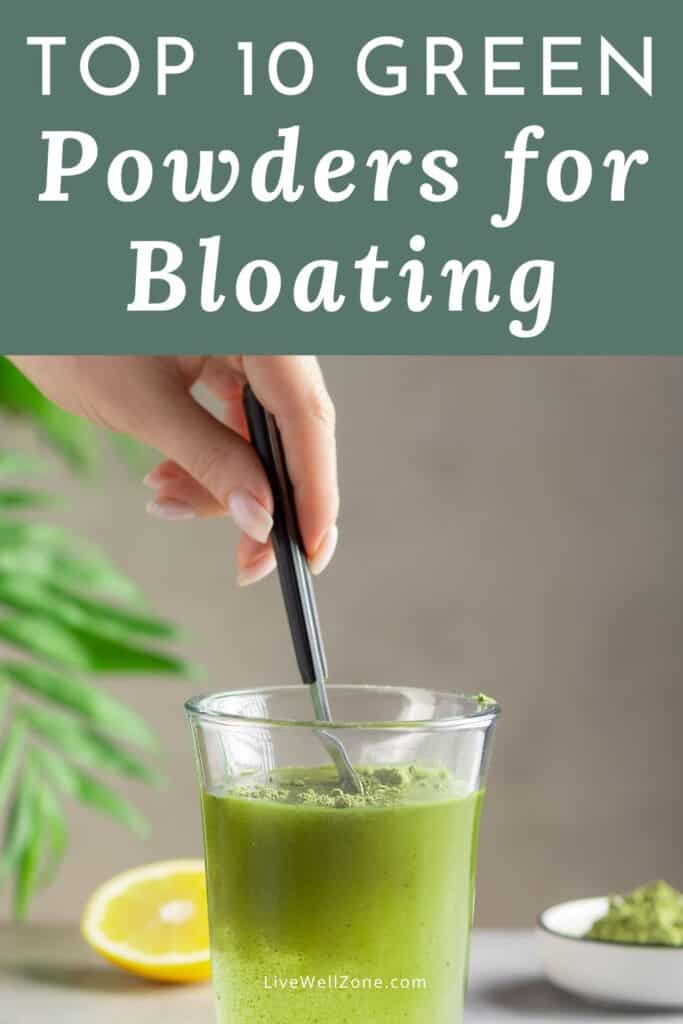
You Might Also Like:
How to Reduce Bloating from Vegetables: 7 Tips for Faster Relief
Green Powder vs Red Powder: Are They Worth It | Which Is Best
High Potassium Foods for Bloating: Best Sources and Benefits
15 Delicious Snacks to Reduce Bloating Fast
11 Green Powders Without Stevia (or Processed Sweeteners) That You Should Know About
Best Protein Powder For Hormonal Balance: Top Brands and What to Look For
5 Green Powders Without Spirulina (Or Other Algae) To Boost Your Health






